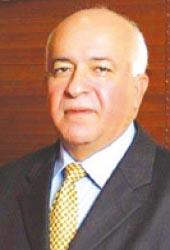You are here
Local elections ‘first step towards broader decentralisation’ — minister
By Dana Al Emam - May 09,2017 - Last updated at May 09,2017

Musa Maaytah
AMMAN — The upcoming local elections, due to take place at the governorate level for the first time, are the first step towards establishing a broader decentralisation system in the Kingdom, a top government official said.
The purpose of the local elections is to enhance citizens’ participation in decision making outside the capital, allowing each governorate to identify its priorities and needs, and follow up on the implementation of development projects, Minister of Political and Parliamentary Affairs Musa Maaytah said.
In a recent exclusive interview with The Jordan Times, Maaytah noted that local councils, which will be elected on August 15, do not enjoy any executive authority, as their role is advisory and focused on development, not politics.
The executive councils in governorates, headed by governors, serve as local governments, according to the law, and their performance is monitored by the local councils.
Parliament holds exclusive legislative powers, he said, noting that local councils are designed to spare legislatures the burden of providing services, allowing the central legislature to focus on crafting legislation.
Membership of governorate councils will not require professionals, such as doctors, engineers, businesspeople and economists, to resign from their jobs before taking up their council responsibilities, the official noted.
Preparations
While the Independent Election Commission (IEC) will manage and supervise the elections, the government is responsible for explaining the Decentralisation Law to citizens and raising awareness about this new process.
The ministry has so far held over 75 educational functions to explain the law to public employees, starting with ministers, said Maaytah, underscoring that the law would be clear to all Jordanians by the day of the elections.
Meanwhile, the IEC has the role of explaining the elections by-law, he noted.
He noted that the ministry has started a media campaign to send out “brief and clear” messages on the Decentralisation Law on TV and radio stations in order to raise awareness of the regulations.
In addition, a number of societies, clubs and youth centres throughout the Kingdom’s governorates have contacted the ministry to conduct similar activities.
Young Jordanians have an opportunity for substantial representation in the upcoming elections as candidates and voters, as Jordanians who are 25 years old or above are eligible to stand in the municipal elections.
“Jordanians are well aware of the municipal elections, as citizens have been electing municipal councils for decades,” the minister said.
Political parties
Constituencies in the local and municipal elections are smaller than those in parliamentary elections, a matter that requires less effort and cost for political parties to compete there, Maaytah explained.
“Succeeding in local and municipal elections depends on candidates’ direct relationships with citizens in the constituency,” he noted, adding that the ministry has conducted several meetings with the 52 political parties over three sessions during which provisions governing participation in the upcoming elections were discussed.
Participation in the local and municipal elections will enhance political parties’ chances in future elections, laying the foundations for work at the parliamentary level, the minister noted.
“This is a chance for political parties, willing to have a stromg foothold in the political arena, to win seats in the local and municipal elections,” Maaytah said , pointing out that all political parties have announced their participation in the elections and have started preparing their lists.
While governorate councils are entrusted with developmental, not political, tasks, the participation of political parties in the local elections stems from their attempts to develop their local communities, he said.
Meanwhile, the by-law governing the financing of political parties, which stipulates linking financing to representation of political parties at the House, is under discussion with political parties, experts and academics, according to the minister.
Appointed members, who comprise 15 per cent of local councils, will be named after the election results are announced, to ensure “fair” representation of all segments of the constituency and the presence of “qualified and experienced” members, Maaytah concluded.
















